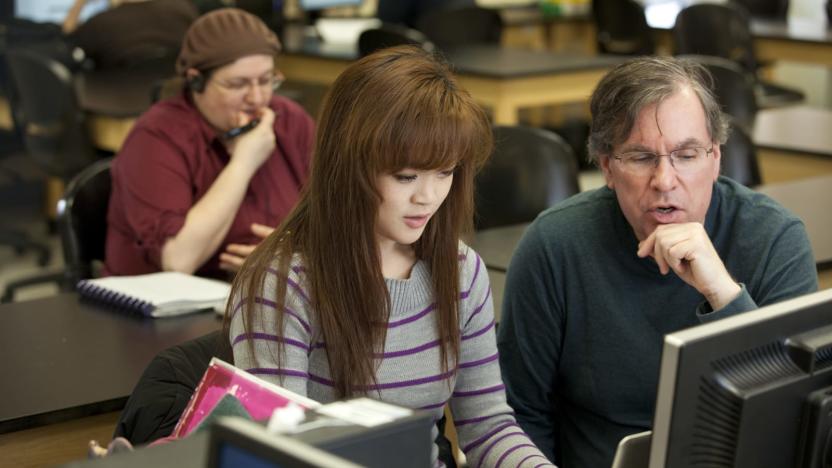learning
Latest

Facebook opens a new AI research lab in Montreal
Facebook's Artificial Intelligence Research team is expanding. The company announced a brand new AI lab that just opened in Montreal, which joins the network of existing labs based in Menlo Park, New York City and Paris. "The Montreal lab will house research scientists and engineers working on a wide range of ambitious AI research projects, but it will also have a special focus on reinforcement learning and dialog systems," Facebook's chief AI scientist, Yann LeCun, said in a post.

Apple launches free courses for the next generation of app coders
Apple has unveiled a free curriculum designed to teach high school and community college students app coding skills. The Swift language course has already been adopted by six US community college systems that will distribute it to half a million students this fall. While it's generous on Apple's part, Tim Cook acknowledged that it needs to address an industry-wide shortage of coders, especially for enterprise apps. "That's really in its infancy, in terms of explosion, and so there's just a ton of opportunity here," he told USA Today.

Tynker app teaches kids Apple Swift with coding games
Coding is as essential to our kids' education as math and history lessons, with tech leaders, presidents and coding organizations touting the importance of the skill. Learning how to create the stuff on which our modern society runs will ready future generations to make the things that the rest of us will use. Tynker, a company that creates self-paced and school-based coding lessons for kids, has partnered up with Apple's Everyone Can Code program to provide two new courses for students in Kindergarten to 5th grade. The free curriculum -- available via the free iTynker iPad app -- is also integrated across two new curriculum modules for teachers in iBooks.

Online learning improves when you feel like you belong
Completing online courses can be daunting, but that's particularly true if you're in a developing part of the world. It's too easy to feel like you don't belong. Researchers may have a solution, though: giving you activities that help you fit in. An MIT and Stanford study has shown that brief psychological "interventions" can dramatically increase the completion rates for online courses in less developed regions. One of these boosts involved reading testimonials from earlier students who overcame that lack of belonging, while another involved writing a short explanation of how the course reflects and serves their values.

Learn a new language with Duolingo's chatbots
Duolingo has been offering language learning tools for a while now, but today the company debuted a new tool inside its iPhone app that could make the task a bit easier. Thanks to AI-powered chatbots, the language-learning app offers a way to have conversations while you're trying to learn French, German and Spanish. That's a short list of languages for now, but Duolingo says more options are on the way.

Lockheed Martin hopes to turn your kids into astronauts
Lockheed Martin knows that its future spacecraft will only fly if there are enough people interested in flying them, so it's trying something a bit unusual: it's helping to raise the next wave of astronauts. It's launching a Generation Beyond program that gives both parents and teachers the resources they need to get middle school kids (grades 6 through 8) excited about space-related science, engineering and math. The internet curriculum shows would-be spacefarers everything from the challenges of living in space (or on Mars) to the careers they can pursue in space exploration.

Brush up on hundreds of topics with the Tinycards app
Plenty of people have turned to the popular language-learning app Duolingo to become well-versed in a different tongue. The company knows how to hammer knowledge into your brain. That's why it's bringing us Tinycards, a special app meant for learning a lot more than language.

Google will teach you to write Android apps
Learning to make your own Android apps isn't easy, especially if it's your first time programming anything. Do you find a tutorial and hope for the best? Sign up for classes at the local college? Google might have a better way. It's introducing an Android Basics nanodegree (available in a week-long free trial) at Udacity that has Google experts teaching you how to write simple Android apps, even if you don't know a lick of code. The online course guides you far enough through Android Studio that you'll have an "entire portfolio" of programs by the time you're done -- you may not write the next Instagram, but you should be comfortable.

Teaching apps could do away with music instructors
The most terrifying thing about learning an instrument is the moment when you have to play in front of an examiner. It's also a moment that future generations might be spared if the new Scalebook app is any indication. The software is designed to help trainee violinists improve their scales in preparation for the big day. What's interesting, however, is that the app can listen to your playing via the iPad's microphone and provide feedback. There's even a mock exam setting where you'll play under test conditions and receive a written report on your performance. Crucially, this information is set out in the same style and format as you'd receive from a flesh-and-blood official from the Associated Board of the Royal Schools of Music.

Google DeepMind AI finds its way through a 3D maze by 'sight'
Google DeepMind has already conquered the world of Go, but its next accomplishment may be walking around in a game of Doom or GoldenEye 007. The artificial intelligence system successfully navigated a 3D maze without cheating -- it didn't have access to the digital world's internal code. Instead, it walked around walls and into rooms by "sight," as New Scientist reports.

Google just released new AI software that can learn faster
Google is ignoring everything the Terminator franchise taught us and is releasing "TensorFlow", open-source software that helps computers learn quicker than ever before. The software is a branch of artificial intelligence called "machine learning," tech that has already found a home in Google Search, Google Photos and Gmail. Tech-giants, like Google, Facebook and Amazon are all working with machine learning to better the services that they offer like smart search, ad targeting and product recommendations. Machine learning is now shifting into a complex realm where researchers are creating computer models that can see and even understand what it's looking at.

Facebook working with schools on a personalized learning app
In an unusual side project, Facebook has built an app that helps teachers create tailor-made student learning plans, and it may come a US school near you for free. The social network got involved in the project after it learned about an institution called Summit Public Schools, which is consistently ranked among California's best. The school gets those results by creating programs customized for each student, then tracking their progress with a software tool called the "Personalized Learning Plan." However, it told Facebook that the technology behind it wasn't up to snuff, so the Zuckerberg and Co. donated a small team to help revamp it.

Microsoft is launching a site to help teachers master 'Minecraft'
Minecraft has proven to be an invaluable tool for educators and students. Not only is the game popular with children and adults, but its open, customisable nature means it can be used for all sorts of different purposes. Like learning to code, understanding Britain's geography and reimagining modern art. Microsoft clearly knows this, so it's launching a new portal where teachers can discuss the game and share classroom resources. The full site isn't live just yet, but the trailer below gives you an idea of what Microsoft and Mojang are aiming for. After this and its Hololens demonstration, it's clear the company sees its $2.5 billion acquisition as more than just a game with a guaranteed smash-hit sequel.

Masterclass offers online lessons with the super famous
If you wanted, say, acting lessons from Dustin Hoffman, you'd probably have to write a check that's bigger than the Empire State Building to make it happen. That's why Masterclass has such an appealing idea, a video-based tutorial site where, unlike those videos on YouTube, the teachers are the best in their field. In addition to acting classes taken by Hoffman, users can opt for tennis coaching from Serena Williams or photography lessons from Annie Leibovitz.

Your Xbox One is ready to teach you a new language
Wish your Xbox One could teach you more vocabulary than just "noob" or "get rekt?" It can now. Rosetta Stone has announced an Xbox One app that will teach you English or Spanish through simulated travel experiences. It also has phrase books, study advice, and cultural tips to keep you in locals' good graces. The app is available as we write, so give it a spin if you're willing to expand your mind after exploding some online rivals.

Qualcomm's next chips will help smartphones think for themselves
Qualcomm teased the prospect of smartphones that learn a couple of years ago, and it's now much closer to making them a practical reality. The chip designer has revealed its next big mobile processor, the Snapdragon 820, will be one of the first that can handle its Zeroth cognitive computing platform. In short, it'll let your phone learn about you (and the world around you) to take action on its own. You should see photo apps that detect whole scenes, security tools that protect against unknown viruses and interfaces that depend more on expressions and head movement than button taps. It gets more ambitious than that, though. Zeroth allows for always-on sensors that detect your surroundings (such as through motion or sound) and help your phone anticipate what you want.

The poetry of my tweets
I'd like to think my tweets offer some cultural value and promote a better world. I consume plenty of brilliant films and scholarly articles, then reflect my learnings on Twitter multiple times a day. So when I heard there was a tool to turn my tweets into real poetry, I expected a reflection of the erudite person I've become. Unfortunately, I was painted as, well...a boob.

PhotoMath uses your phone's camera to solve equations
Need a little help getting through your next big math exam? MicroBlink has an app that could help you study more effectively -- perhaps too effectively. Its newly unveiled PhotoMath for iOS and Windows Phone (Android is due in early 2015) uses your smartphone's camera to scan math equations and not only solve them, but show the steps involved. Officially, it's meant to save you time flipping through a textbook to check answers when you're doing homework or cramming for a test. However, there's a concern that this could trivialize learning -- just because it shows you how to solve a problem doesn't mean that the knowledge will actually sink in. And if teachers don't confiscate smartphones at the door, unscrupulous students could cheat when no one is looking. The chances of that happening aren't very high at this stage, but apps like this suggest that schools might have to be vigilant in the future.

The science of language, community, and MMORPGs
Back in August, Massively wrote a little post about Swedish research on MMOs and language learning. That article provoked me, a gamer and teacher of English for speakers of other languages (ESOL), to hunt down the original research and talk directly to the researchers, Dr. Liss Kerstin Sylvén from the University of Gothenburg and Dr. Pia Sundqvist from Karlstad University, to better understand their research and findings. Note that we'll be talking here about games and language learning specifically, not other forms of game-related education. Also, Sylvén and Sundqvist don't consider themselves "gamers." Sundqvist remembers Pac-Man as her first game, both admit to playing Angry Birds on their cell phones, and Sundqvist is "allowed" to sometimes watch her 17-year-old son play League of Legends. I find this interesting because they are non-gamers who seriously consider games capable of being educational without specifically being developed to do so. This isn't a simple merger of a hobby with work; this is work in a field of interest that's still being explored.

iTunes U on iPad will let teachers create courses and take your questions
Right now, iTunes U on the iPad isn't a complete educational tool. You can read textbooks, but not much else -- you still need to use old-fashioned email to ask the teacher a question, for example. It's going to be much more useful on July 8th, when Apple releases a major overhaul to the app. The new iTunes U lets teachers create and manage courses entirely from the iPad, plucking source material from other apps and even the device's camera. Students, meanwhile, get some much-needed interaction -- you can now ask questions from the app, or join in class discussions.











